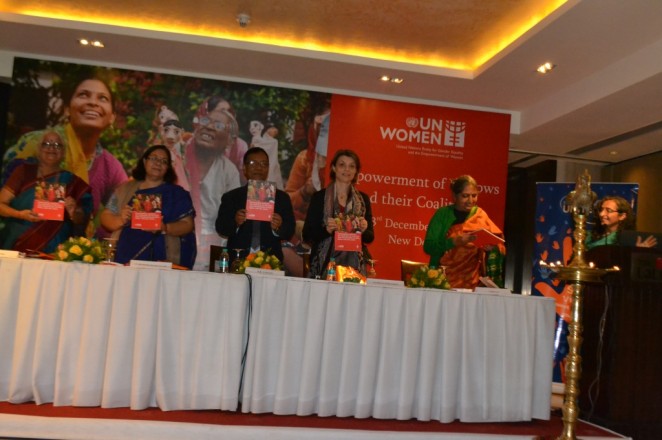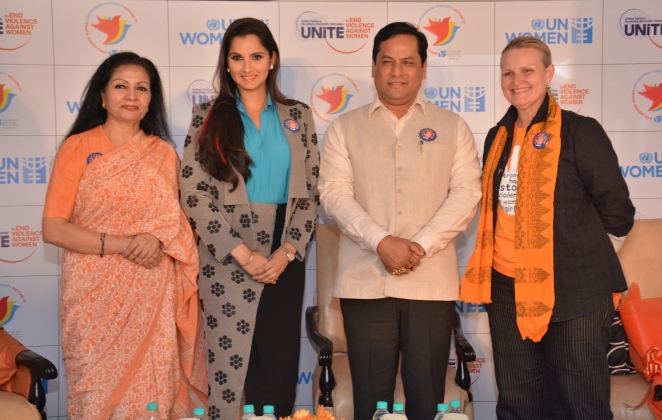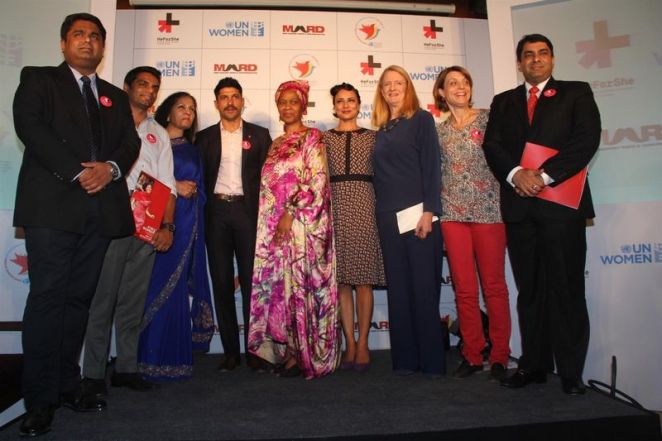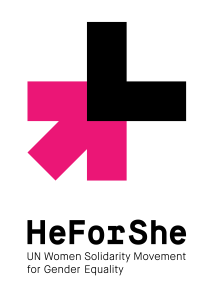By the United Nations Secretary-General, Ban Ki-moon during his official visit to India
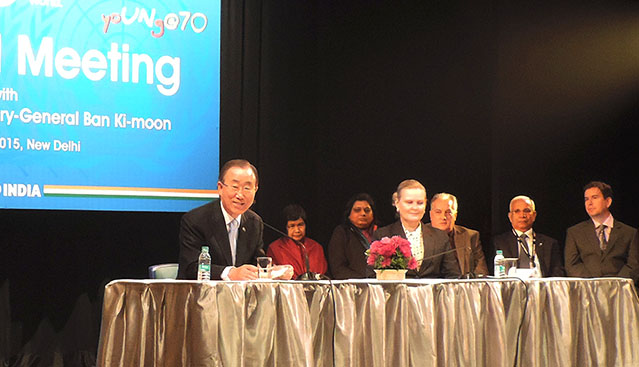
Good evening, everyone!
Namaste.
What a dynamic gathering.
As Secretary-General, I have been receiving a lot of attention, a lot of people [noticed] wherever I went but this evening seems to be an exception; I am the least-known, least important person sitting among these bright stars. They are shining a lot of lights. I have been completely overshadowed! That is why I came first [on the programme]: to show myself.
I am so impressed and humbled to be here with such notable celebrities, individuals who carry strong power and global reach in working together with the United Nations.
Nobel Laureate Kailash Satyarthi has inspired me. I just met him briefly. This is my not first time; we met in New York before. Since he got the Nobel Peace Prize, this is the first time [we met]. I congratulated him. I really admired with deepest respect his lifelong fight and commitment to save a lot of children from human slavery. I hope that he will continue to work to bring hope and peace, to bring to all these people to a peaceful, happy childhood.
Sachin Tendulkar: I heard that he is God of cricket. Now he goes to bat for the United Nations. I hope he will hit hard and far.
Sharmila Tagore is a shining superstar helping countless children through her work for UNICEF. I just heard that she is a great grand niece of Rabindranath Tagore. Tagore is very well known and respected by so many Korean people and I am very glad that she is lending her fame to this very noble work.
Nandita Das is another incredible celebrity advocate for UNICEF making a real difference in the lives of children.
Make sure you leave some autographs before you leave!
I thank you all for your strong commitment, leadership and vision. I know how busy you are – you are wanted here and there – still you are lending your time and vision for global peace and harmony.
Tonight is all about to discuss and commit ourselves to make a better world and to discuss about the future we want; what kind of a future do you really want to inherit to your children and great grandchildren? This is our moral and political responsibility today.
We are coming together to launch the UN@70. You know that UN is celebrating its 70th anniversary. It was found in 1945; now this is 2015.
I thank all of my UN colleagues in India led by Ms. Grande, our Resident Coordinator. In fact, she is leaving to take another very important job responsibility in Iraq. Let’s give a big encouragement.
Now all these supporters, they came up with a wonderful slogan: this is, “yoUNg@70”.
It is a clever play on words. If you want to write y-o-u-n-g, you cannot write “young” without UN. So that is very clever wordplay but it is also a brilliant initiative to involve young people. The timing is perfect – today is National Youth Day in India. Congratulations for your commitment and wisdom.
India has more young people than any other country in the world. The number of young people under 25 – you are the biggest country in that regard.
I am delighted that the National Progressive Schools Conference will be involved in helping to explain the United Nations to young audiences – and to raise a new generation of global citizens. I also welcome the members of Model UN conferences, members of UN Associations in India for their strong support.
I applaud my UN family in India for basing the commemorations on partnerships – and for using the incredible amplifying power of social media to spread the word.
I have today three messages that I hope you will push out today on your own networks.
Now I am going to speak in sentences that will fit in tweets. I hope some of you will be tweeting.
First: Investing in women and children is the most powerful way to attain global progress.
Second: We have to fight for the equality of all members of our human family regardless of any difference, including sexual orientation.
Third: When we strengthen the UN-India partnership, this country and our world will advance.
I hope you are tweeting!
I give so much priority to women’s and children’s welfare because I have seen its value for all people.
We have major UN initiatives to drive progress: I have established launched Every Woman Every Child, Global Education First, UNiTE to End Violence against Women and our daily work around the world.
We are striving to provide women and girls with proper health services, including for sexual and reproductive health. We are pushing for equality in education. We are advocating for the human rights of women and girls. Our goal is to empower them to contribute to our common future.
India has made great progress – but it still has the highest number of deaths of children under the age of five, and about a quarter of all mothers who die in childbirth are laid to rest in India.
I commend the Government’s efforts to address these issues. I applaud Prime Minister Modi for committing to expanding vaccine coverage. I also welcome his initiative to put a toilet in every household and school by 2019. This is a matter of health and safety – especially for women and girls.
Dear friends,
We are all different from one another, but we all have the same human rights.
I am proud to stand for the equality of all people – including those who are lesbian, gay, bisexual and transgender.
I staunchly oppose the criminalization of homosexuality.
I speak out because laws criminalizing consensual, adult same-sex relationships violate basic rights to privacy and to freedom from discrimination. Even if they are not enforced, these laws breed intolerance.
As you may know recently, last year, just a few months ago, I have made UN regulations change to allow the same entitlement to those staff who have different sexual orientations.
I am very grateful to the Bollywood celebrities who have joined the United Nations Free & Equal campaign, especially Celina Jaitly and Imran Khan. They have reached millions of people with a message of equality.
I have had a deep connection with India since I came here for my first diplomatic posting. My son was born in India during that. Maybe since we have such a strong family feeling about India it was only natural that my daughter found an Indian man as her husband. Today, this afternoon, as soon as I arrived in Delhi, I met my in-laws.
I even enrolled in Max Mueller Bhavan – maybe some of you know Max Mueller Bhavan where they taught languages – to study some Hindi. That was so long ago, 42 or 43 years ago, I would sound old-fashioned if I try to speak it! But I used to say Main Hindi thoda thoda bolta hun. [“I speak a little bit of Hindi.”]
But let me try anyway.
Mera iss desh ke saath ek gehra bandhan hai. Main Bharat vaapas aae bohot khush hua. [“I have a deep connection with this country. I am very happy to be back in India.”]
I admit I have great personal affection for India. But I am speaking objectively – objectively – when I say that India is an important country for me but much more important for the United Nations. It is one of our big contributors to peacekeeping, Democracy Fund and many other initiatives.
I came here to strengthen our partnership because India’s collaboration with the United Nations is good for this country and for our world.
You are all showing a great sense of global citizenship. I thank you for your engagement. I am confident that we can use the UN@70 commemorations to strengthen the valuable UN-India bond.
Yesterday, I visited the Sabarmati Gandhi Ashram in Gujarat. I reflected on the legacy of Mahatma Gandhi.
From the very birth of the idea of the United Nations, he supported it. Gandhi once said, “India would be morally bound to help the United Nations.”
Let us take up this call so that India and the United Nations, helping each other, can help our world together.
The Future we Want must be built by our hands. I have been saying that the future is in our hands so we need to have all of our hands together.
To mark the 70th anniversary of the United Nations, I declare what people across the planet already know: that a strong United Nations means a better world, a more harmonious peaceful world.
Sashakt Sanyukt Rashtra, Shresht Vishva. [“Strong UN, Better World.”]
Hamesha young rahe! [“Always stay young!”]
Dhanyavaad. Thank you
– See more at: http://asiapacific.unwomen.org/en/news-and-events/stories/2015/1/secretary-general-s-remarks-at-launch-of-un-70#sthash.6ylDtCGk.dpuf


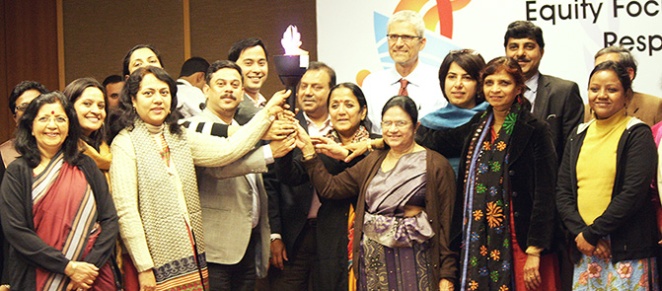

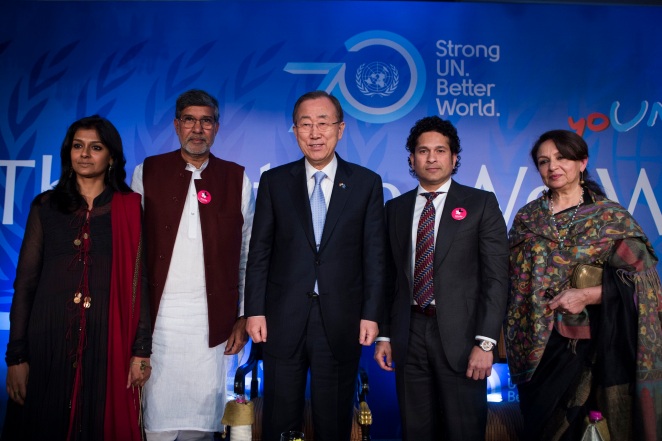
 Archana Sardana – Scaling new horizons with daring dives
Archana Sardana – Scaling new horizons with daring dives
